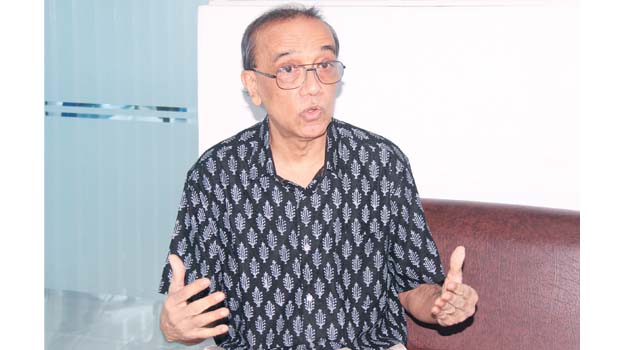Leaves luxury to serve people

Synthia Kainath Nur
After 22 years of practicing dentistry in the USA, giving up a secure and peaceful life there, Dr. Wadud Reza DDS (NYU), BDS (DDC), has come back to his motherland in 2017, because of his dedication and love for the people of Bangladesh. He is working to help the medical practitioners, including doctors and nurses to improve their skill and hygiene methods.
The doctor’s chamber is situated in the middle of Banani road 11. As I entered the office of Global Dental Center, I was impressed by the lighted and airy ambience, with natural light streaming in from all corners. The floors, tabletops, everything was gleaming, as if it were all brand new.
Dr Reza was in the middle of an appointment with a patient when we walked in. His receptionist asked us to wait a while and look around the office.
He begins by showing us small glass cylinders which contain local anesthetic liquid. He said that this must not be used more than once as it carries the risk of cross-contamination. The doctor says that there is no way that these can be sterilized after being used once. He urges anyone in our country still reusing them on patients to stop doing so to avoid the spread of HIV, Hepatitis B and C.
Dr Reza says, ‘We make sure to break the cylinders (Local anesthetic) after using them once. Otherwise, they would be collected from the garbage and resold in the market. He continued, ‘Please do not reuse gloves as well on multiple patients to prevent cross contamination.’
The doctor’s office is fully equipped with ultra modern facilities, sterilizing equipment in vacuum packed bags and digital diagnostic tools. There is also a sterilizer machine and x-ray machine along with other top notch equipments.
He says, ‘The multiple use of unsterilized and unhygienic local anesthetic syringes have been identified in several studies across Turkey, Egypt and Pakistan as a source of epidemics. However, in our country, these are used without a second thought.’
Majority of the dental supplies in Dr Reza’s office have been imported from the USA. According to Dr Reza, around 60% of the US population is allergic to latex. So the norm in most of the hospitals and practices is using nitrile gloves. In our country, it is extremely hard to find nitrile gloves. No one is willing to import it as no one would buy it. I don’t want to risk allergic reactions in my patients so I use nitrile gloves.’
He further states that we should not use plastic bibs instead of one time use bibs. ‘I’d also tell doctors to not use cotton balls to stop bleeding. It can lead to complications and infections as the cotton can get mixed with blood or get trapped in the wound. The common practice in the US is to use 2x2 gauze.’
He said that proper safety precautions should be taken by technicians during X-rays as being exposed to harmful analog radiation is about 4 to 5 times more harmful than digital radiation. Dr Reza states that back in America, doctors are required to take 40/50 credit hours to renew their license every 2/3 years (varies state to state) to make them up to date.
We talked about doctors taking commission in Bangladesh when prescribing diagnostic procedures and medical tests. Dr Reza had to face this problem when he first started his practice. The diagnostic centers would offer him commission but he always refused and asked for discounts to be given to his patients. However, no such discount was given and so he decided to purchase his own diagnostic tools, i.e., a digital x-ray machine including OPG.
Dr Reza states that the OPG machine is not a diagnostic tool. The OPG is just to get a general idea and it should not be used as a diagnostic tool for treatment. This is one of the reasons that wrong treatment may take place.’
He mentioned the over use of antibiotics and antacids among the medical community. He says that it has become so widespread that now patients question him if he does not prescribe unnecessary antibiotics and antacids. ‘They’ve become so used to it that some patients think I must be doing something wrong when I do not prescribe antibiotics for the simplest procedures.’
He sees more than 8 to 10 patients every day. He says he could be seeing more but he likes to take at least an hour with each patient. His phone is always on in case of any patient emergencies. Despite not getting any assistance after moving back to the country, Dr Reza is fighting on, trying to provide world-class treatment to patients in Bangladesh.
In his parting words, Dr Reza emphasized the need to improve the civic sense among the citizens of the country. He also lectures students of dental colleges on these issues. ‘I think that if we can train 3rd and 4th year students correctly, for at least 4/5 years to teach them strong ethics and help them understand the errors of treatment that is so prevalent here, we can see a change in the state of dental practice in the country within a short time.’
‘Policies are already there. We now need to become serious about implementation of these policies as well as starting to take responsibility of our own actions.’




